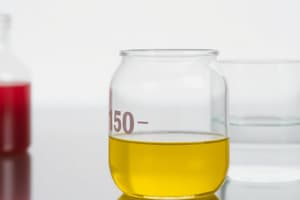Podcast
Questions and Answers
What is the scope of chemistry's subject matter?
What is the scope of chemistry's subject matter?
Chemistry studies the chemical elements that make up matter, compounds made of atoms, molecules and ions, their composition, structure, properties, behavior, and the changes they undergo during reactions with other substances. It also addresses the nature of chemical bonds in chemical compounds. Chemistry occupies an intermediate position between physics and biology and is sometimes called the central science because it provides a foundation for understanding both basic and applied scientific disciplines at a fundamental level.
How does chemistry provide a foundation for understanding scientific disciplines?
How does chemistry provide a foundation for understanding scientific disciplines?
Chemistry provides a foundation for understanding both basic and applied scientific disciplines at a fundamental level because it explains aspects of various fields such as plant growth (botany), formation of igneous rocks (geology), atmospheric ozone formation and environmental pollutant degradation (ecology), properties of the soil on the moon (cosmochemistry), how medications work (pharmacology), and more.
What is the relationship between chemistry and physics and biology?
What is the relationship between chemistry and physics and biology?
Chemistry occupies an intermediate position between physics and biology. It is sometimes called the central science because it provides a foundation for understanding both basic and applied scientific disciplines at a fundamental level.
What are some specific examples of how chemistry is applied in other scientific disciplines?
What are some specific examples of how chemistry is applied in other scientific disciplines?
What does chemistry study in terms of matter and compounds?
What does chemistry study in terms of matter and compounds?
What is the purpose of the IUPAC nomenclature of organic chemistry?
What is the purpose of the IUPAC nomenclature of organic chemistry?
What is the significance of IUPAC nomenclature of inorganic chemistry?
What is the significance of IUPAC nomenclature of inorganic chemistry?
How do IUPAC names compare to common or trivial names for organic compounds?
How do IUPAC names compare to common or trivial names for organic compounds?
When are the official IUPAC naming recommendations not always followed in practice?
When are the official IUPAC naming recommendations not always followed in practice?
What is the publication that contains the IUPAC nomenclature of organic chemistry?
What is the publication that contains the IUPAC nomenclature of organic chemistry?
Flashcards are hidden until you start studying




